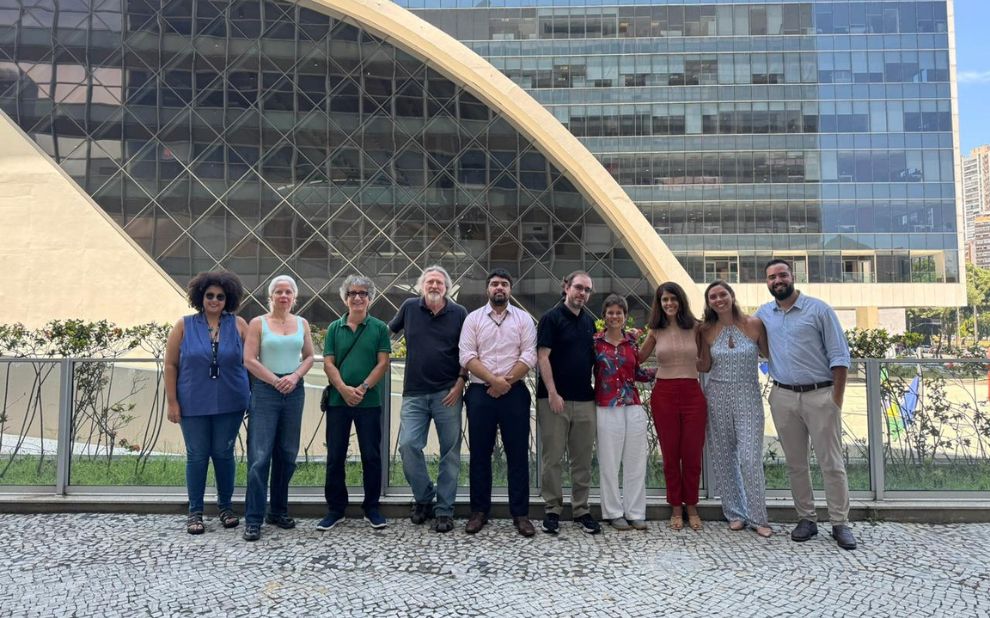Mathematics applied to well-being: studies show the impact of digital tools on public health
Researchers from FGV EMAp received researchers from Biomanguinhos/Fiocruz to discuss the possibilities of applying mathematics with a view to generating advances in Public Health in Brazil.

On the morning of January 21, researchers from the Getulio Vargas Foundation's School of Applied Mathematics (FGV EMAp) were visited by researchers from Bio-Manguinhos/Fiocruz in order to find potential synergies and possible fields for joint action. On the occasion, the FGV researchers presented projects they are developing based on machine learning and Artificial Intelligence that can promote public health in Brazil.
The deputy director of FGV EMAp, Claudio Struchiner, pointed out that mathematical systems can play an important role in supporting decision-making on immunization and other public health topics. “In this scenario, the School was created in 2011 with the aim of developing contemporary mathematics, adapted to the challenges of the information and knowledge age,” he said.
Mathematical epidemiology
During the meeting with researchers from Biomanguinhos/Fiocruz, the FGV researchers presented some projects they are developing that could have an impact on the health area.
FGV EMAp researcher Guilherme Goedert highlighted the importance of mathematical epidemiology, a field that studies how information on communicable diseases can be treated from a quantitative point of view. This knowledge can support everything from patient care to preparing for future pandemics.
“At FGV EMAp we have a very interdisciplinary group and we work with a focus on strengthening the health system, evaluating public health interventions and preparing society for future epidemics,” the researcher introduced.
Among the projects that Goedert leads, there is research that can be applied to prevent epidemics, improve cancer treatment and support decision-making in health policies.
In the field of epidemics, he highlighted the “COmVIDa” project in partnership with Fiocruz and researcher Lara Coelho, which carried out a serological study of one of the largest favela complexes in the world, the Maré complex, as well as analyzing the links between social inequality and epidemiological vulnerability, and the impact that the pandemic has had on food security.
“Through Big Data and Machine Learning, we can assess the impact of the pandemic on society and the health system, in multiple spheres,” he said.
Researchers from FGV EMAp's Mathematical Epidemiology group are already designing a protocol for the Rio de Janeiro State Health Department (SES) to carry out syndromic surveillance in near real time. This is a surveillance strategy that makes it possible to detect a set of clinical manifestations common to a larger number of diseases.
“Our Machine Learning model will help organize medical data and apply AI with a focus on speeding up the analysis of groups of cases and atypical cases. Through this grouping, it is possible to mobilize vector control teams more quickly, improve the chances of immunizing the population and provide better data flows for mathematical and statistical models in order to evaluate epidemic scenarios and design interventions,” said the researcher.
These and other projects are part of the AutoAI-Pandemics working group, which emerged from a partnership with the Institute of Mathematical and Computer Sciences at the University of São Paulo (ICMC-USP) and was the best evaluated for the formation of the international network Artificial Intelligence for Pandemic and Epidemic Preparedness (AI4PEP).
This network, funded by the Canadian agency International Development Research Center (IDRC), aims to develop solutions to problems in the Southern Hemisphere to deal with future epidemics. In addition to developing AI-based tools for pandemic preparedness, the project seeks to present solutions to reduce inequalities in access to these technologies.
Using mathematical models, the researchers can also assess how much infections increase in the entire city using a specific scenario as a parameter, such as understanding the effect of keeping schools closed to reduce the spread of a particular virus.
Goedert points out that technological tools also help to extract data from medical records that are not structured. “By training Artificial Intelligence models, it is possible to develop systems capable of carrying out automated analyses and interventions,” explained the researcher.
Support for cancer treatment and clinical trials
According to Goedert, the systems have numerous application possibilities. Among them, it is possible to automate the monitoring of patients undergoing cancer treatment which, according to the National Cancer Institute (INCA), is one of the world's main public health problems.
“Even with new treatments, mortality remains high in developing countries, due to problems with access and basic infrastructure, as well as challenges with data and indicators for managing and optimizing services,” he explained.
The system created by the researchers is capable of extracting and analyzing hospital data from various sources to automatically monitor individual patients, alerting the medical team to necessary interventions.
Luiz Max, also a researcher at FGV EMAp, adds that the mathematical models are capable of generating better and cheaper drug efficacy and side effect tests.
“We combine historical data and grounded methods to obtain possible predictions of the side effects of certain substances,” said the researcher.
Partnerships with health institutions
Faced with various technological solutions capable of impacting the health sector, Goedert draws attention to the possibility of establishing collaborations with health research institutions in order to apply the mathematical models in practice.
“We could apply new AI-based protocols to optimize patient care, promote syndromic and epidemiological surveillance, and develop and validate new testing protocols,” she said.
Cintia Nunes, an advisor to the Vice-Directorate of Innovation at Biomanguinhos/Fiocruz, believes that public health gains more agility in all its work to develop health studies by encompassing other areas of knowledge such as applied mathematics.
“Thinking about market prospecting and technological prospecting, applied mathematics allows us to act more assertively towards what we want. Mathematical models and Artificial Intelligence come to contribute to all the planning for the future of public health,” he said.
To find out more about the applied mathematics projects that could have an impact on the health sector, visit:
Leia também
